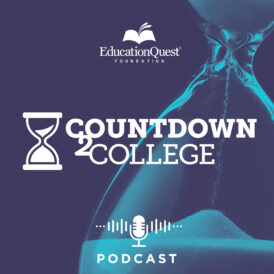
October 14, 2025 · Season 2 · Episode 11
College: What's the Point?
By Natalie Becerra & Gage
Feeling unsure what college is even for? This episode, Gage and UNL Career Development Specialist Natalie Becerra unpack the real value of post-high-school education, whether that’s a 4-year university, a 2-year degree, community college, or a skilled trade. We dig into how to weigh cost vs. long-term earning potential, what to know about loans, and how the college experience can help you grow.
There’s a lot of talk right now about whether college is “worth it.” After all, tuition is expensive, student debt is a genuine concern, and not every career requires a four-year degree. So…what’s the point? On a recent episode of our Countdown2 College podcast, Natalie Becerra, a career development specialist at the University of Nebraska–Lincoln, discussed why education after high school still matters, paths students can take, and how to make choices that fit both your goals and your budget.
College Isn’t One-Size-Fits-All
Becerra explained that “college” is an umbrella term. It can mean a two-year associate’s degree, a certificate from a trade school, or a bachelor’s degree from a university. Which path is right for you depends on what kind of career you’re aiming for. The key is knowing that there are options—and that you don’t have to follow the same path as your friends.
More Education = More Opportunities
Why keep learning after high school? The biggest reason is money. Becerra said the numbers speak for themselves: people with a high school diploma earn, on average, less than those with an associate or bachelor’s degree. Beyond paychecks, extra training often means increased job security, more options, and greater flexibility over your lifetime.
It’s All About the Right Fit
College isn’t free, and the price tag can feel intimidating. That’s why Becerra encourages students to think about alignment. Does your program match your career interests? Does it fit your budget? When you’re studying something that excites you and sets you up for future goals, the investment is more likely to pay off.
Try Things Out Before You Decide
Not sure what you want to do yet? That’s totally normal! Becerra recommends using high school as a time to explore. Take a career assessment, shadow someone in a job that interests you, or try out classes in a career academy if your school offers one. Sometimes figuring out what you don’t like is just as valuable as discovering what you do.
Make the Most of College Life
Once you’re on campus, wherever that is, get involved. College isn’t just about sitting in classrooms. Building relationships with professors, connecting with advisors, joining clubs, and finding internships all help you learn new skills and meet people who can open doors for you later. The more you dive in, the more opportunities you’ll find.
You Don’t Need All the Answers Right Now
It’s easy to feel pressure to have your whole future figured out. Becerra’s advice? Take small steps. Pick an area that interests you, explore it, and stay open to change. Careers often shift, and what you start with may not be what you stick with—and that’s okay.
Parents: Encouragement Goes a Long Way
Families can make a big difference in helping students feel supported. Instead of pressuring you into a specific path, Becerra suggests that parents ask questions like, “What excites you? What do you imagine yourself doing?” Honest conversations about money are also important, allowing you to balance your dreams with realistic plans.
Education Is an Investment in You
At the end of the day, Becerra wants students to see education as more than just a piece of paper. It’s an investment in your future self—opening doors, giving you skills, and helping you grow. Whether you choose a two-year program, a four-year degree, or a trade credential, taking that next step after high school sets you up for more opportunities ahead.
